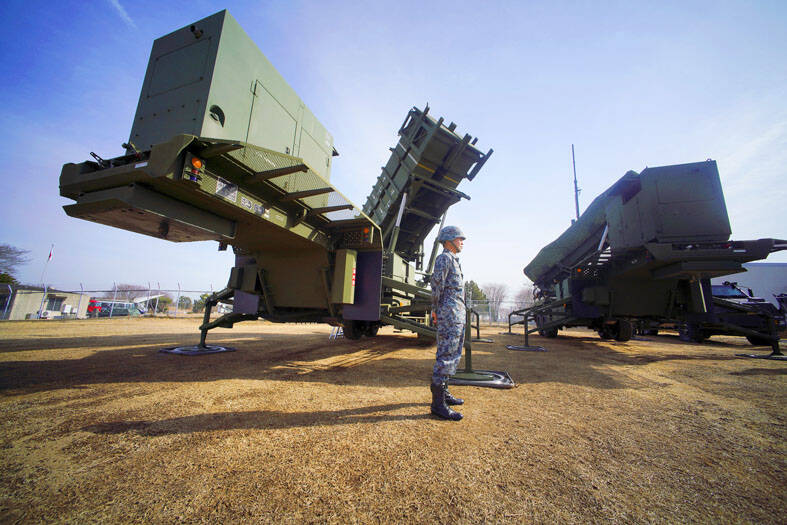The Japanese Cabinet on Friday approved a hefty 16 percent increase in military spending next year and eased its postwar ban on lethal weapons exports, underscoring a shift away from the country’s self-defense-only principle.
The moves came as Japan accelerates the deployment of long-range cruise missiles that can hit targets in China or North Korea, while Japanese troops increasingly work with allies and take on more offensive roles.
In the latest step under a new security strategy that Japan adopted a year ago, Japanese Prime Minister Fumio Kishida’s government also allowed the export of weapons and components made in Japan under foreign licenses to the licensing nations. The move is the first major revision of Japan’s arms export ban since an earlier easing in 2014.

Photo: AP
The ¥7.95 trillion (US$55.8 billion) defense budget for the 2024 fiscal year that begins in March marks the second year of the five-year military buildup program.
The national budget still needs to be approved by the parliament.
“In taking the action, we hope to contribute to defend a free and open international order based on the rule of law, and to achieve the peace and stability in the Indo-Pacific region,” Kishida told reporters. “There is no change to our principle as a pacifist nation.”
The government quickly approved the first export shipment under the change, agreeing to send to the US surface-to-air Patriot guided missiles produced in Japan under a US license.
Officials said it would complement US stock, raising speculation that Japanese-produced Patriot missiles might be sent to Ukraine.
The easing also paves the way for possible exports to the US, the UK and six European licensing nations involving dozens of lethal weapons and components, including F-15s and fighter jet engines.
“The scope, scale, and speed of Japan’s security reforms have been unprecedented,” US Ambassador to Japan Rahm Emanuel wrote on X.
He praised the easing of the defense equipment and transfer policy as historic and “a significant example of Japan’s shared commitment to deterrence.”
The ban on the export of lethal weapons has limited the scope of Japan’s efforts to develop arms technology and equipment.
The easing would help strengthen Japan’s feeble defense industry and broaden the country’s new official military aid designed for like-minded nations in the Indo-Pacific region in countering Chinese assertiveness, experts say.
Japan is next year spending more than ¥70 billion on developing a next-generation fighter jet with the UK and Italy, and the project hinges on a further easing of restrictions to allow the export of jointly developed lethal weapons to third countries — a change Kishida wants by the end of February.
The centerpiece of Japan’s military budget for next year is an early deployment of “standoff” missiles that officials say are needed to reinforce air defenses, especially to protect Japan’s southwestern islands in case a conflict erupts between China and Taiwan.

A Ministry of Foreign Affairs official yesterday said that a delegation that visited China for an APEC meeting did not receive any kind of treatment that downgraded Taiwan’s sovereignty. Department of International Organizations Director-General Jonathan Sun (孫儉元) said that he and a group of ministry officials visited Shenzhen, China, to attend the APEC Informal Senior Officials’ Meeting last month. The trip went “smoothly and safely” for all Taiwanese delegates, as the Chinese side arranged the trip in accordance with long-standing practices, Sun said at the ministry’s weekly briefing. The Taiwanese group did not encounter any political suppression, he said. Sun made the remarks when

The Taiwanese passport ranked 33rd in a global listing of passports by convenience this month, rising three places from last month’s ranking, but matching its position in January last year. The Henley Passport Index, an international ranking of passports by the number of designations its holder can travel to without a visa, showed that the Taiwan passport enables holders to travel to 139 countries and territories without a visa. Singapore’s passport was ranked the most powerful with visa-free access to 192 destinations out of 227, according to the index published on Tuesday by UK-based migration investment consultancy firm Henley and Partners. Japan’s and

BROAD AGREEMENT: The two are nearing a trade deal to reduce Taiwan’s tariff to 15% and a commitment for TSMC to build five more fabs, a ‘New York Times’ report said Taiwan and the US have reached a broad consensus on a trade deal, the Executive Yuan’s Office of Trade Negotiations said yesterday, after a report said that Washington is set to reduce Taiwan’s tariff rate to 15 percent. The New York Times on Monday reported that the two nations are nearing a trade deal to reduce Taiwan’s tariff rate to 15 percent and commit Taiwan Semiconductor Manufacturing Co (TSMC, 台積電) to building at least five more facilities in the US. “The agreement, which has been under negotiation for months, is being legally scrubbed and could be announced this month,” the paper said,

NATIONAL SECURITY THREAT: An official said that Guan Guan’s comments had gone beyond the threshold of free speech, as she advocated for the destruction of the ROC China-born media influencer Guan Guan’s (關關) residency permit has been revoked for repeatedly posting pro-China content that threatens national security, the National Immigration Agency said yesterday. Guan Guan has said many controversial things in her videos posted to Douyin (抖音), including “the red flag will soon be painted all over Taiwan” and “Taiwan is an inseparable part of China,” while expressing hope for expedited “reunification.” The agency received multiple reports alleging that Guan Guan had advocated for armed reunification last year. After investigating, the agency last month issued a notice requiring her to appear and account for her actions. Guan Guan appeared as required,